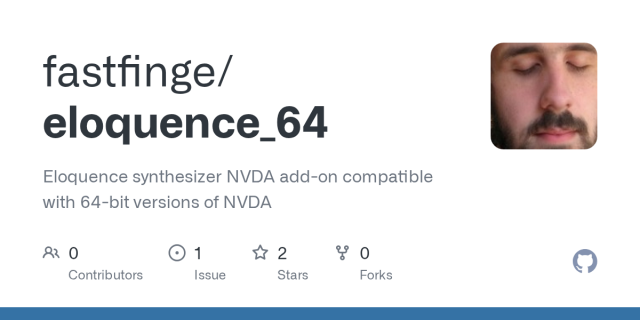Edit: This is now released. Say all works, though the audio becomes choppy sometimes. But it doesn't crash.
Right! I now have a copy of Eloquence that works on the 64-bit alphas of #NVDA, with the following issues: say all on the web doesn't work (it stops whenever the type of element changes for reasons I don't understand), and dialect switching doesn't work (but it doesn't crash everything anymore). If you want to play, you need to follow the build instructions; I only understand about a quarter of this code and have no intention of actually releasing things that are still broken: github.com/fastfinge/eloquence_64/
Right! I now have a copy of Eloquence that works on the 64-bit alphas of #NVDA, with the following issues: say all on the web doesn't work (it stops whenever the type of element changes for reasons I don't understand), and dialect switching doesn't work (but it doesn't crash everything anymore). If you want to play, you need to follow the build instructions; I only understand about a quarter of this code and have no intention of actually releasing things that are still broken: github.com/fastfinge/eloquence_64/

GitHub - fastfinge/eloquence_64: Eloquence synthesizer NVDA add-on compatible with 64-bit versions of NVDA
Eloquence synthesizer NVDA add-on compatible with 64-bit versions of NVDA - fastfinge/eloquence_64GitHub
This entry was edited (3 months ago)
James Scholes
in reply to 🇨🇦Samuel Proulx🇨🇦 • • •🇨🇦Samuel Proulx🇨🇦
in reply to James Scholes • • •🇨🇦Samuel Proulx🇨🇦
in reply to 🇨🇦Samuel Proulx🇨🇦 • • •🇨🇦Samuel Proulx🇨🇦
in reply to James Scholes • • •🇨🇦Samuel Proulx🇨🇦
in reply to James Scholes • • •James Scholes
in reply to 🇨🇦Samuel Proulx🇨🇦 • • •🇨🇦Samuel Proulx🇨🇦
in reply to James Scholes • • •🇨🇦Samuel Proulx🇨🇦
in reply to James Scholes • • •James Scholes
in reply to 🇨🇦Samuel Proulx🇨🇦 • • •I suppose I initially asked because of it defaulting to a Python helper process written in Python, using sockets as the IPC mechanism. Which is very AI, based on what will have been most common in the training data.
But for this sort of thing, I wonder about performance gains from shared memory, COM, or whatever with something other than Python on the other end.
🇨🇦Samuel Proulx🇨🇦
in reply to James Scholes • • •feld
in reply to 🇨🇦Samuel Proulx🇨🇦 • • •@jscholes
> and AI can't help because we don't have the development headers for ECI.dll to feed it.
Ohhh I bet you could get it decompiled with something like IDA Pro and feed it to an AI model and get somewhere
🇨🇦Samuel Proulx🇨🇦 likes this.
🇨🇦Samuel Proulx🇨🇦
in reply to feld • • •🇨🇦Samuel Proulx🇨🇦
in reply to James Scholes • • •James Scholes
in reply to 🇨🇦Samuel Proulx🇨🇦 • • •SAPI5IBMTTS/eci.h at master · datajake1999/SAPI5IBMTTS
GitHub🇨🇦Samuel Proulx🇨🇦
in reply to James Scholes • • •James Scholes
in reply to 🇨🇦Samuel Proulx🇨🇦 • • •🇨🇦Samuel Proulx🇨🇦
in reply to James Scholes • • •James Scholes
in reply to 🇨🇦Samuel Proulx🇨🇦 • • •🇨🇦Samuel Proulx🇨🇦
in reply to James Scholes • • •Matt Campbell
in reply to James Scholes • • •🇨🇦Samuel Proulx🇨🇦 likes this.
🇨🇦Samuel Proulx🇨🇦
in reply to Matt Campbell • • •James Scholes
in reply to 🇨🇦Samuel Proulx🇨🇦 • • •🇨🇦Samuel Proulx🇨🇦
in reply to James Scholes • • •Matt Campbell
in reply to 🇨🇦Samuel Proulx🇨🇦 • • •🇨🇦Samuel Proulx🇨🇦
in reply to Matt Campbell • • •Day Garwood
in reply to 🇨🇦Samuel Proulx🇨🇦 • • •I probably know even less about IPC and threads, but there's plenty of learning scope in that department.
🇨🇦Samuel Proulx🇨🇦
in reply to Day Garwood • • •eloquence_64/host_eloquence32.py at master · fastfinge/eloquence_64
GitHubAlex Chapman
in reply to Day Garwood • • •🇨🇦Samuel Proulx🇨🇦
in reply to Alex Chapman • • •Alex Chapman
in reply to 🇨🇦Samuel Proulx🇨🇦 • • •🇨🇦Samuel Proulx🇨🇦
in reply to Alex Chapman • • •